The party met up at the Royal Exchange for a hearty breakfast of bacon sandwiches and coffee, with some partaking of the local scrumpy, before we headed off to the coast.
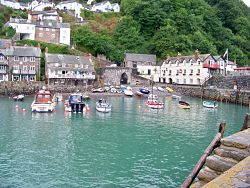
Upon arriving at the quayside at Clovelly, the picturesque Devon fishing village, we split the group into two, one half climbed aboard the Jessica Hettie, headed by Neil, which became known as the old folks boat. The rest of us boarded the Independent and by 9 o'clock we were headed out of Clovelly and towards Lundy Island, several miles off shore.
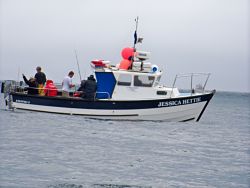
The weather had been wet initially, but this had cleared by the time we boarded the boats, and there was little wind, although we were suprised at the size of the swell after a long sustained spell of good weather. It took just over an hour to reach the island and we quickly set up on the east coast with mackerel tackle, these would be bait as well as supper back at the pub.
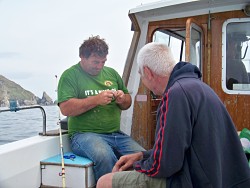
The tackle of choice initially was a string of feathers with a weight at the bottom. These were lowered to the sea bed and gently raised and lowered using the rod. The mackerel are normally pretty quickly onto such bait, but it proved a very slow start.
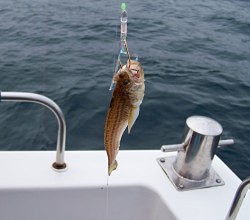
Our boat was first to catch a lance and a weaver fish. The latter has toxic spines so we were glad to see the skipper handle that one. He said it was only the second one that he had caught in 25 years running boats, and can be lethal dependant upon the sensitivity of the individual, much like a bee sting. There were seven grown men on board, all edging away nonchalently from a four inch long fish!!!
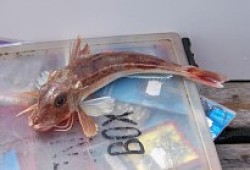
I was next into a fish which was... another weaver fish. It seems thay come together just like buses, and although I caught a small gurnard, there were no mackerel caught.
The skippers then decided to move off the southern end of the island in the deeper water and try there.
Here the sport quickly improved as mackerel came at a steady rate, interspersed with pollack to about 3lbs. It was great to see everybody catching fish, but our boat continued to catch the exotic with a cuckoo wrasse coming aboard, one of three caught in the day, all by the same angler.
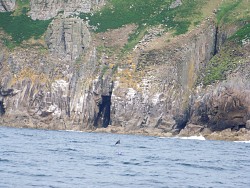
As the sport started to slow, we moved from mark to mark along the west coast of the island, and although plenty of fish were being caught, there were none of any size.

However, Phil on the old folks boat put this right. He lowered his feathers and had a violent tug which nearly wrenched the rod from his grasp, taking him a little by suprise. This was followed by a second tug and a lunge which bent the rod right over underneath the boat. After what seemed an interminable time he boarded a 9lbs 12oz pollack, easily the best fish of the day. However, I must point out that we think they had an advantage as both Phil and Ray were a little seasick, and we think groundbaiting should have been banned.
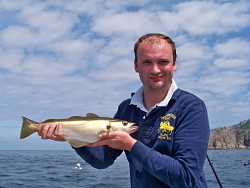
We tried anchoring at another mark using a weight and larger bait, but this only yielded the customary dogfish for me, and a sizeable bull huss for Dave, and after a while we reverted to feathers, some with a piece of mackerel attached for bait, and drifting over marks. The stream of pollack and mackerel continued, together with a couple of codling and a ballen wrasse.
All in all, it was a good days sport with lots of mackerel to take home, all of the pollack being returned for two reasons; some were undersize and with so many mackerel, we all had enough to take home for meals. None of us believe in killing fish that are not going to be eaten.
We got back into Clovelly at about 6 o'clock, and after some light refreshment in the local hostelry, headed back to the Royal Exchange where Bridget, Neil's wife, had prepared the barbecue for the mackerel which, together with the local ales, was just what we needed after a fun day out in the fresh air.
I look forward to next years excursion.